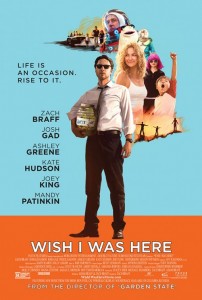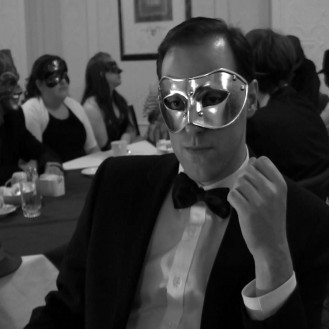Epiphanies are mentioned in Wish I Was Here, Zach Braff’s return as a filmmaker. It’s during a scene where Braff’s Aidan Bloom camps out with his two children Tucker and Grace (played by Pierce Gagnon and Joey King) on the outskirts of Los Angeles, where they find a gorgeous view of the desert on top of three isolated boulders.
This talk about epiphanies made me nostalgic for Braff’s 2004 indie hit Garden State, a work that I truly believe changed the face of how people look at independent films and an inspiration for budding filmmakers as to how they could emulate – or rip off – Braff’s quirky style.
In Garden State, audiences were enchanted by scenes featuring burn outs and drifters chatting about the cards life has dealt them. Suddenly, someone would accidentally spout off something deep about where they saw themselves currently or how the past has affected them. These moments of clarity were written with perfection, as if they were unintentionally rambled off with honesty fuelling them. You could see the characters surprise themselves.
These moments would be far and few between, but that was the point. These epiphanies – as they often do – would gradually materialize until someone felt the need to piece together their thoughts aloud in a conversational, trustworthy environment.
That’s where I feel Wish I Was Here let me down. If Garden State has epiphanies, Wish I Was Here has epiphanays.
This time, Zach has written the film’s screenplay with his brother Adam, and the insight is a non stop succession – as if the brothers are firing off gating guns using motivational books and CDs for ammo.
The screenwriters feel the need to drop revelations fast and furiously in order to steady its emotional backbone. The legitimacy behind the realizations and the confidence they’re delivered with seems contrived because the Braffs overwhelm us. The would-be poignancy flounders further since the dialogue is structured in a way you’d find inside a fortune cookie at the end of an all-you-can-eat Chinese buffet. The theory of “less is more” is not found in Wish I Was Here, which makes it less of an emotional vehicle from a filmmaker who wants to do nothing more than to emotionally move us.
Braff is a filmmaker who makes movies from his heart, which I appreciate. The reason why he hasn’t helmed a film since 2004 is probably because he got everything off of his chest in his breakout. Wish I Was Here visits material that is obviously close to Braff, but we’ve seen the filmmaker take on before. He’s still feeling distraught about the life of an actor and the desire for approval from a fatherly figure. Braff is playing a similar song, but he hasn’t lost any of his stirred passion.
Wish I Was Here has Braff walking on some new ground though. The filmmaker delves into more spiritual territory focusing on the Bloom’s devoutness to their Jewish background and schooling (especially young Grace who teaches her father a thing or two). As much as Braff takes his audience through rituals and prayers, his presentation doesn’t go into overkill. Although, I would like to hear the perspective of a Jewish movie goer on the topic of Braff’s representation of the school’s rabbis.
The script may lack conviction, but there’s not a single bad performance. Kate Hudson is terrific as Aidan’s supportive wife, Josh Gad adds another scene stealing performance to his resume, and Jim Parsons is delightful as an actor Aidan occasionally runs into. Twilight’s Ashley Greene doesn’t have a whole lot to do, but if she’s here to provide eye candy, then mission accomplished. It’s also notable to mention that Zach Braff still has a good ear for music. Scorsese has The Stones, this New Jerseyan has The Shins.
Wish I Was Here is a prosaic pitch that’s missing discipline and patience, with a screenplay in need of a peer edit. But despite its problems, I still believe Braff has a sturdy career as a director in his future. In fact, in the movie, someone suggests he should take up teaching since he’s so well-spoken and thoughtful. The omission that he would also make a good writer is more than appropriate in this case.





Leave a comment